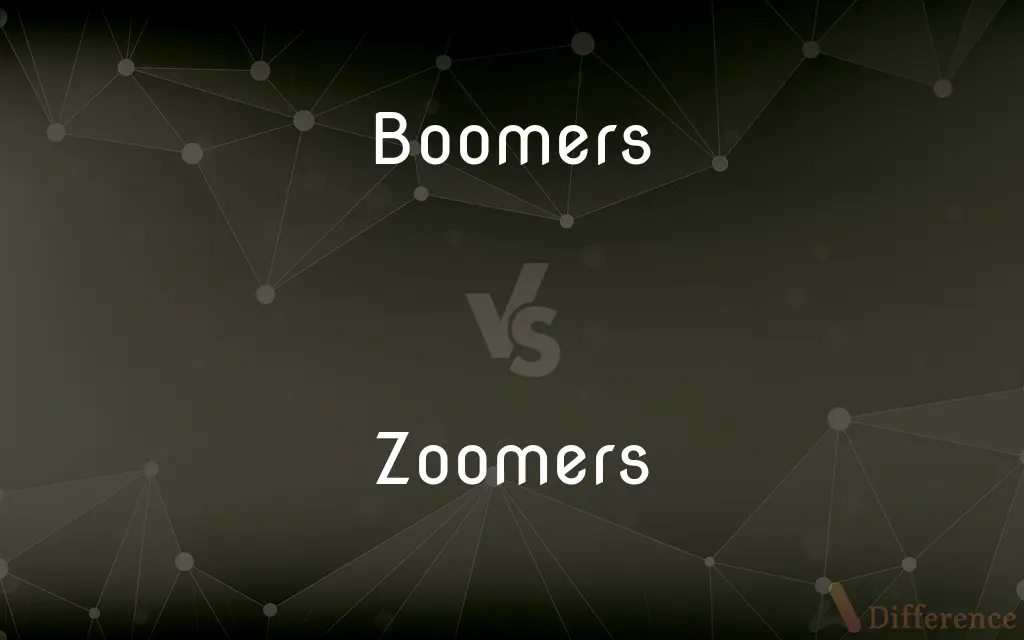Boomers vs. Zoomers — What's the Difference?
Edited by Tayyaba Rehman — By Fiza Rafique — Published on October 2, 2023
Boomers refer to the Baby Boomer generation born post-WWII (1946-1964), while Zoomers are the Gen Z individuals born roughly from mid-1990s to mid-2000s.

Difference Between Boomers and Zoomers
Table of Contents
ADVERTISEMENT
Key Differences
Boomers and Zoomers are two distinct generational labels. Boomers, short for Baby Boomers, refer to the surge in birth rates after World War II, primarily covering those born between 1946 and 1964.
Zoomers, on the other hand, are a colloquial term for Generation Z. This group consists of people born from the mid-1990s to the mid-2000s, succeeding the Millennial generation.
Culturally, Boomers witnessed events like the Civil Rights Movement and the Vietnam War. The foundation of their upbringing was traditional values. Zoomers, conversely, are digital natives, growing up in the age of the internet and technology, resulting in a more globalized perspective.
Socio-economically, Boomers often benefited from a robust economy, making milestones like homeownership more achievable. In contrast, Zoomers face challenges like increased student debt and housing crises, despite being better educated.
Technological differences between Boomers and Zoomers are profound. While Boomers adapted to technology in their adulthood, Zoomers were born into a digital age, with smartphones, social media, and instant communication shaping their experiences.
ADVERTISEMENT
Comparison Chart
Birth Years
1946-1964
Mid-1990s to mid-2000s
Historical Events
Vietnam War, Civil Rights Movement
Rise of the internet, Social Media
Economic Climate
Post-WWII economic boom
Economic challenges, student debt
Cultural Upbringing
Traditional values, nuclear family
Digital age, diverse perspectives
Technological Era
Adapted to technology in adulthood
Born into a digital world
Compare with Definitions
Boomers
Boomers refer to the generation born post-World War II.
The Boomers experienced significant societal changes in their youth.
Zoomers
This generation followed the Millennials.
After the Millennial era, the Zoomers began their cultural influence.
Boomers
This generation was a result of a "baby boom" post-war.
Post-war prosperity resulted in the Boomers generation.
Zoomers
Zoomers denote the Generation Z individuals.
My younger brother, born in 2000, is among the Zoomers.
Boomers
They saw key historical events during their lifetime.
The Boomers actively participated in the Civil Rights Movement.
Zoomers
They are known as digital natives.
Growing up with smartphones makes Zoomers digitally adept.
Boomers
They're characterized by traditional values.
Many Boomers hold strong traditional family values.
Zoomers
Typically born from mid-1990s to mid-2000s.
Most Zoomers can't recall a time before the internet.
Boomers
The term represents those born between 1946 and 1964.
My parents, born in 1960, are part of the Boomers generation.
Zoomers
They're recognized for their global and diverse outlook.
The Zoomers often advocate for global issues like climate change.
Boomers
One that booms
An amp that is a real boomer.
Zoomers
Plural of zoomer
Boomers
(Informal) A baby boomer.
Boomers
(Informal) A nuclear submarine armed with ballistic missiles.
Boomers
A transient worker, especially in bridge construction.
Boomers
(Australian) A large, fully grown male kangaroo.
Boomers
Plural of boomer
Common Curiosities
Are Zoomers tech-savvy?
Yes, Zoomers are considered digital natives, growing up in the age of the internet.
Who does the term Zoomers refer to?
Zoomers refer to Generation Z, those born from the mid-1990s to the mid-2000s.
Who are the Boomers?
Boomers, or Baby Boomers, are individuals born from 1946-1964, post-World War II.
What historical events did Boomers witness?
Boomers lived through events like the Vietnam War and the Civil Rights Movement.
When did the Boomer generation start and end?
Boomers were born between 1946 and 1964.
How do Zoomers view social issues?
Zoomers are typically more progressive, advocating for issues like climate change and equality.
What characterizes Zoomers in terms of culture?
Zoomers have a more globalized perspective, influenced heavily by technology and the internet.
Are Zoomers more or less educated than Boomers?
Zoomers are, on average, more educated but face challenges like student debt.
Why are Boomers named so?
The term "Boomers" comes from the "baby boom" post-World War II.
How do Boomers and Zoomers differ in communication styles?
While Boomers might prefer face-to-face or phone conversations, Zoomers lean heavily on digital communication platforms.
Did Boomers grow up with technology?
Boomers adapted to technology in their adulthood but didn't grow up with it.
What was the economic climate for Boomers?
Boomers often experienced a strong economy and post-WWII prosperity.
Do Zoomers rely on traditional media?
Zoomers typically lean more towards digital platforms and social media.
Did Boomers have an impact on pop culture?
Yes, Boomers significantly influenced music, movies, and television during their youth.
What challenges do Zoomers face today?
Zoomers confront issues like climate change, economic disparities, and mental health concerns.
Share Your Discovery

Previous Comparison
Hypothesis vs. Aim
Next Comparison
Milk vs. Condensed MilkAuthor Spotlight
Written by
Fiza RafiqueFiza Rafique is a skilled content writer at AskDifference.com, where she meticulously refines and enhances written pieces. Drawing from her vast editorial expertise, Fiza ensures clarity, accuracy, and precision in every article. Passionate about language, she continually seeks to elevate the quality of content for readers worldwide.
Edited by
Tayyaba RehmanTayyaba Rehman is a distinguished writer, currently serving as a primary contributor to askdifference.com. As a researcher in semantics and etymology, Tayyaba's passion for the complexity of languages and their distinctions has found a perfect home on the platform. Tayyaba delves into the intricacies of language, distinguishing between commonly confused words and phrases, thereby providing clarity for readers worldwide.
















































